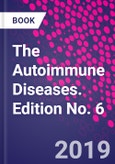The Autoimmune Diseases, Sixth Edition, emphasizes the "3 P's" of 21st Century medicine: precision, prediction and prevention. Topics cover the modern systems approach to biology that involves large amounts of personalized, ongoing physiologic data ("omics") coupled with advanced methods of analysis, new tests of genetic engineering, such as CRISPR, auto inflammatory diseases, autoimmune responses to tumor immunotherapy, and information on normal immune response and disorders. Each of the major autoimmune disorders is discussed by researchers and clinical investigators experienced in dealing with patients. Chapters emphasize the immunologic basis of the disease as well as the use of immunologic diagnostic methods and treatments.
The book also covers several cross-cutting issues related to the recognition and treatment of autoimmune diseases, including chapters on the measurement of autoantibodies and T cells, the use of biomarkers as early predictors of disease, and new methods of treatment.
Table of Contents
Section 1: Immunologic Basis of Autoimmunity 1. Prelude: Historical introduction to autoimmunity and autoimmune disease 2. Structural and Functional Aspects of the Innate and Adaptive Systems of Immunity 3. General Features of Autoimmune Diseases 4. Antigen Presentation, Dendritic Cells, and Autoimmunity 5. T cells and their subsets 6. Role of Th1 Th2 Th17 Cells in Autoimmunity 7. Tolerance and Autoimmunity: T Cells 8. Regulatory T Cells 9. B Cells and Autoimmunity 10. Immunological memory T cells 11. Immunological memory B cells 12. Apoptotic Cells as a Source of Autoantigens 13. Effector Mechanisms of Autoimmunity: Antibodies and Immune Complexes 14. Functional Effects of Autoantibodies 15. Cytokine Chemokines 16. Signaling Pathways in T and B Lymphocytes 17. HLA Genetics and Autoimmunity 18. Non HLA Genetics 19. AIRE related Autoimmunity 20. Immune Deficiencies and Autoimmunity 21. Infections and Autoimmunity 22. Noninfectious Environmental Agents and Autoimmunity 23. Sex, Pregnancy and Autoimmunity 24. Animal Models of Autoimmune Disease
Section 2:�Multisystem Diseases 25. Systemic Lupus Erythematosus 26. Systemic Sclerosis, Scleroderma 27. Antiphospholipid Syndrome 28. Sjogren Syndrome 29. Rheumatoid Arthritis 30. Spondyloarthritis and Chronic Idiopathic Arthropathies 31. Myositis 32. Thyroid Disease 33. Type 1 Diabetes 34. Adrenalitis 35. Polyendocrine Syndromes 36. Gastritis and Pernicious Anemia 37. Hypophysitis 38. Hemolytic Anemia 39. Thrombocytopenic Purpura 40. Neutropenia 41. Aplastic Anemia 42. Clotting Disorders 43. Multiple Sclerosis 44. Peripheral Neuropathy 45. Myasthenia Gravis 46. Ocular Disease 47. Inner Ear Disease 48. Celiac Disease 49. Inflammatory Bowel Diseases: Ulcerative Colitis and Crohn's Disease 50. Chronic Hepatitis 51. Primary Billiary Cirrhosis 52. Primary Sclerosing Cholangitis 53. Pancreatitis 54. Bullous Skin Diseases: Pemphigus and Pemphigoid 55. Non-Bullous Skin Diseases: Alopecia, Vitiligo, Psoriasis and Urticaria 56. Kidney Disease: Goodpasture's Disease, Lupus Nephritis, ANCA-Associated Glomerulonephritis 57. Orchitis and Male Infertility 58. Oophoritis 59. Rheumatic Heart Disease 60. Myocarditis and Dilated Cardiomyopathy 61. Necrotizing Arteritis and Small Vessel Vasculitis 62. Large and Medium Vessel Vasculitides 63. Autoimmune Disorders of the Lung 64. Paraneoplastic Diseases 65. Antibody-Associated Neurological Diseases 66. Autoinflammatory and other Related Diseases
Section 3: Diagnosis, Prevention, and Therapy 67. Autoantibody Assays, Testing, and Standardization 68. Prediction of Autoimmune Disease 69. Emerging Therapies for Autoimmune Diseases 70. Postlude
Authors
Eric Gershwin Distinguished Professor of Medicine, The Jack and Donald Chia Professor of Medicine and Chief, Division of Rheumatology, Allergy and Clinical Immunology, University of California at Davis, USA. M. Eric Gershwin, MD, is chief of the division of rheumatology, allergy, and clinical immunology at the University of California at Davis. Gershwin is currently working to further understand the molecular basis of immune regulation in autoimmunity. He also studies the molecular-genetic basis of autoimmune liver disease. Gershwin is interested in the molecular and genetics tools being utilized to study the genes that contribute to a patient's susceptibility to lupus and the cellular and subcellular mechanisms that lead to immune disease. George Tsokos Professor of Medicine, Harvard Medical School, and Chief, Rheumatology Division, Beth Israel Deaconess Medical Center, Boston, MA, USA.Dr. Tsokos is Professor of Medicine, at the Harvard University, and chief of Rheumatology, Boston, USA George C. Tsokos, MD, is a Professor of Medicine at Harvard Medical School and on staff at Beth Israel Deaconess Medical Center, Harvard Medical School, Boston, MA. His research interests focus on the cellular and molecular mechanisms involved in the pathogenesis of systemic lupus erythematosus and mechanisms that lead to tissue injury. The overall goal of his research is the identification of molecular therapeutic targets and disease activity biomarkers. He is the past-President of the Clinical Immunology society and has served on the Boards of Directors of the Research Foundation of the American College of Rheumatology and the Lupus foundation of America. . He currently serves as Consulting Editor of the Journal of Clinical Investigation, Editor of Autoimmunity, and Associate editor-in-chief of Clinical Immunology while he serves numerous editorial boards








